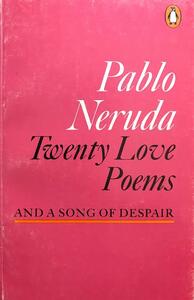Take a photo of a barcode or cover
emotional
fast-paced
emotional
reflective
sad
fast-paced
Tonight I can write the saddest lines.
I loved her, and sometimes she loved me too.
Tonight I can write the saddest lines.
To think that I do not have her. To feel that I have lost her.
To hear the immense night, still more immense without her.
I loved her, and sometimes she loved me too.
Tonight I can write the saddest lines.
To think that I do not have her. To feel that I have lost her.
To hear the immense night, still more immense without her.
emotional
lighthearted
reflective
fast-paced
emotional
reflective
sad
emotional
reflective
sad
medium-paced
challenging
dark
emotional
reflective
sad
medium-paced
I’ve never read poetry before. Twenty Love Poems and a Song of Despair by Pablo Neruda was my first real experience with it, and while I can’t say I understood everything, I can definitely say I felt something.
To be completely honest, I don’t get 95% of the metaphors in this book. The deeper meanings, the symbolism—all of that mostly went over my head. But at the same time, I understood what Neruda was trying to say in a way that I can’t really explain. It’s a contradiction, but it makes sense to me: I don’t fully understand the poems, yet I get them.
Certain lines gave me goosebumps. Certain poems—like Tonight I Can Write and I Like for You to Be Still—hit me in a way I didn’t expect. I can’t break them down or analyze them, but I know they sound beautiful. I know they made me feel something deep, even if I wouldn’t be able to explain exactly why.
I don’t know how to judge poetry. I can’t tell what makes a poem “great” or a “masterpiece.” But I do know that this book made me realize poetry isn’t just about understanding—it’s about experiencing. And even though this was my first time reading poetry, I know it won’t be my last.
For anyone who’s never read poetry before and doesn’t think they would understand it, I’d still say: give this book a try. You might not get every word, but you might get enough—and that’s more than enough to make you feel something real.
Like many people, I first encountered the poetry of Pablo Neruda when I was 15 or 16, a romantic teenager on the lookout for love poetry that would speak to me or speak for me. Upon reading "The Captain's Verses" and "Twenty Love Poems and a Song of Despair" for the first time as a rash young teenager, I rashly leapt to the conclusion that Neruda's poetry was the one to fit the bill. Looking back from the vantage point of adulthood, I now realize that Neruda's vision of love is starkly different from my own, and when I reread "Twenty Love Poems" these days, my dominant emotional response is one of bafflement. I feel baffled by the extent to which Neruda objectifies the woman he loves. Over and over, he likens her to a "toy doll" or a "snail," a field of wheat or a plot of earth waiting to be plowed; at times, I get the feeling that he considers her and her body to be one and the same. Casting his beloved as an inscrutable and sometimes terrifying force of nature, Neruda never seems to acknowledge her agency, her point-of-view, or the fact that she even has a mind. Similarly, when I reread Neruda's "Elemental Odes," I feel alienated by what strikes me as an anti-intellectual agenda lurking beneath the beautiful and vivid words: in "Ode to the Book," for example, he states, "My poems have not eaten poems....I'm on my way with dust in my shoes, free of mythology." Like his love poetry, these lines of Neruda's leave me feeling baffled, wondering what I am to make of this seemingly total rejection of centuries of mythological and literary tradition. I love Neruda, I really do, but reading his poetry sometimes leaves me with a sinking feeling that the world is opaque, and its opaqueness is sometimes dazzling, sometimes frightening, but it is never quite satisfying. I am left feeling a little suffocated, too.
Maybe I'll return to Neruda in a few years and feel differently. For now, my favorite Neruda poems are, curiously, the ones that interested me the least when I was first exposed to his works as a teenager: i.e., the bloody political poems, like the absolutely masterful "I'm Explaining a Few Things."
Maybe I'll return to Neruda in a few years and feel differently. For now, my favorite Neruda poems are, curiously, the ones that interested me the least when I was first exposed to his works as a teenager: i.e., the bloody political poems, like the absolutely masterful "I'm Explaining a Few Things."
Probably read the wrong translation but mid
Lost what made it hit
Lost what made it hit




